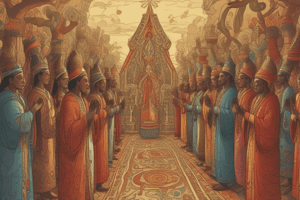Podcast
Questions and Answers
What is the primary focus of psychoanalytic theories in psychological development?
What is the primary focus of psychoanalytic theories in psychological development?
- Unconscious influences and early life experiences (correct)
- Conscious behaviors and social interactions
- Behavioral conditioning and environmental stimuli
- Cognitive processes and rational thinking
What does Freud's concept of the 'Id' represent in his theory of personality?
What does Freud's concept of the 'Id' represent in his theory of personality?
- The realistic portion balancing urges and morals
- The moral conscience guiding behavior
- Instinctual drives seeking pleasure (correct)
- The social norms that influence our actions
What is the main goal of Freud's psychosexual stages of development?
What is the main goal of Freud's psychosexual stages of development?
- To gain social acceptance and approval
- To achieve pleasure through mastering specific tasks (correct)
- To develop cognitive understanding of reality
- To avoid conflicts with societal norms
According to Erikson's psychosocial theory, what is a key component of psychological development?
According to Erikson's psychosocial theory, what is a key component of psychological development?
What can develop if a specific stage in Freud's psychosexual development is not successfully mastered?
What can develop if a specific stage in Freud's psychosexual development is not successfully mastered?
What marks the official transition to adulthood in Western countries?
What marks the official transition to adulthood in Western countries?
During early adolescence, which key focus is emphasized?
During early adolescence, which key focus is emphasized?
Which of the following is not a typical cognitive change during adolescence?
Which of the following is not a typical cognitive change during adolescence?
What are the key features of emerging adulthood?
What are the key features of emerging adulthood?
Which statement accurately describes the trend in marriage among adults from 1970 to the present?
Which statement accurately describes the trend in marriage among adults from 1970 to the present?
In which stage of development do individuals start experiencing significant hormonal changes?
In which stage of development do individuals start experiencing significant hormonal changes?
What percentage of 25-34 year olds were not working or going to school in 2015?
What percentage of 25-34 year olds were not working or going to school in 2015?
What is a common socioemotional change experienced during adolescence?
What is a common socioemotional change experienced during adolescence?
What characterizes the Formal Operational stage in Piaget’s Theory of Cognitive Development?
What characterizes the Formal Operational stage in Piaget’s Theory of Cognitive Development?
According to Vygotsky’s Sociocultural Theory, which factor is crucial for cognitive and social development?
According to Vygotsky’s Sociocultural Theory, which factor is crucial for cognitive and social development?
What does the Information-Processing Theory suggest about cognitive development?
What does the Information-Processing Theory suggest about cognitive development?
What is the main idea behind Piaget's Theory of Cognitive Development?
What is the main idea behind Piaget's Theory of Cognitive Development?
What aspect of behavior does BF Skinner's Theory of Operant Conditioning focus on?
What aspect of behavior does BF Skinner's Theory of Operant Conditioning focus on?
What is the primary purpose of descriptive research?
What is the primary purpose of descriptive research?
A hypothesis is best described as which of the following?
A hypothesis is best described as which of the following?
In experimental research, what is the main goal?
In experimental research, what is the main goal?
What does a correlation coefficient of 0 indicate?
What does a correlation coefficient of 0 indicate?
In correlational research, if there is a negative correlation, what can be inferred?
In correlational research, if there is a negative correlation, what can be inferred?
What is a common misconception about correlation and causation?
What is a common misconception about correlation and causation?
Which of the following steps is NOT part of the scientific method?
Which of the following steps is NOT part of the scientific method?
What does statistical significance indicate in research?
What does statistical significance indicate in research?
What is the primary role of the independent variable in an experimental study?
What is the primary role of the independent variable in an experimental study?
What is a key characteristic of the control group in an experiment?
What is a key characteristic of the control group in an experiment?
Which of the following is a disadvantage associated with longitudinal studies?
Which of the following is a disadvantage associated with longitudinal studies?
Which data collection method is likely to provide the most authentic insight into behavior?
Which data collection method is likely to provide the most authentic insight into behavior?
What is a limitation of using physiological measures in research?
What is a limitation of using physiological measures in research?
What does informed consent ensure in psychological research?
What does informed consent ensure in psychological research?
Which ethical guideline aims to keep participant information private?
Which ethical guideline aims to keep participant information private?
Why is debriefing important after a psychological study?
Why is debriefing important after a psychological study?
Which of the following is a strength of systematic observation in research?
Which of the following is a strength of systematic observation in research?
What is one of the main drawbacks of the case study method?
What is one of the main drawbacks of the case study method?
Flashcards are hidden until you start studying
Study Notes
Cultural Rites of Passage
- Western cultures often lack formal rites marking the transition to adulthood.
- Individuals may define adulthood based on various factors like age (18, 21, 25), full-time employment, marriage, or parenting.
Nature of Adolescent Development
- Development involves biological, cognitive, and socioemotional processes.
- Biological: Physical changes occur during puberty.
- Cognitive: Thinking and intelligence evolve throughout adolescence.
- Socioemotional: Personality, emotions, and relationships change, influenced by social contexts.
Periods of Development
- Adolescence: Transition phase focusing on preparation for adulthood.
- Early Adolescence (ages 11-13): Pubertal changes begin.
- Late Adolescence (ages 15-18): Identity exploration, career interests, and dating emerge.
- Early Adulthood (ages 18-25): Emphasizes personal and economic independence and career development.
Key Transitions: Childhood to Adolescence
- Biological: Puberty initiates hormonal changes, growth spurts, and sexual maturation.
- Cognitive: Transition to more abstract, idealistic, and logical thinking.
- Socioemotional: Increased peer interactions, more conflicts with parents, and mood fluctuations.
Key Transitions: Adolescence to Adulthood
- Adolescence connects biology with culture, featuring identity exploration and a sense of instability.
- Emerging adulthood is characterized by feeling “in-between,” being self-focused, and experiencing a time of possibilities.
Changing Landscape of Emerging & Early Adulthood
- Approximately one-third of young adults live with parents (2015 data).
- There's a rise in the number of well-educated individuals who prioritize educational and economic achievements over traditional milestones (marriage/parenthood).
- Marriage is increasingly delayed; in 1970, 80% married by 30, now it's 80% by 45.
- Fewer women are homemakers, dropping from 43% in 1970 to 14% today.
Influential Theories on Psychological Development
- Psychoanalytic Theories: Focus on unconscious influences of early experiences.
- Freud’s Theory: Introduced the unconscious mind, emphasizing that unresolved childhood conflicts affect behavior.
Freud’s Psychosexual Stages of Development
- Development occurs through stages focused on pleasure associated with specific body parts.
- Fixations can occur if tasks aren't mastered at each stage.
Erikson’s Psychosocial Theory
- Psychological development is influenced more by social experiences than sexual desire.
- Development occurs in eight stages, where each stage presents a crisis to resolve, impacting future progression.
Cognitive Theories
- Emphasize the growth of cognitive processes in children.
- Piaget’s Theory: Children construct understanding through four stages: sensorimotor, preoperational, concrete operational, and formal operational.
- Vygotsky’s Theory: Highlights the role of social interaction and culture; society's tools influence learning.
Information-Processing Theory
- Compares human cognitive processes to computer functions without proposed developmental stages.
- As age increases, so does the capacity for information processing.
Behavioral Theories
- Study observable behaviors and factors influencing them.
- Skinner’s Theory: All behavior is learned; utilizes operant conditioning principles.
Elements of Psychological Research
- Steps include identifying a problem, collecting and analyzing data, and drawing conclusions.
Types of Research
- Descriptive: Reports on behaviors and experiences.
- Correlational: Examines the relationship between variables.
- Experimental: Investigates cause-and-effect relationships.
Experimental Research Framework
- Independent and dependent variables define the experiment.
- Control and experimental groups help isolate effects.
Research Methods Comparison
- Cross-Sectional Studies: Compare different age groups at a single point.
- Longitudinal Studies: Track the same individuals over time for detailed insights.
Data Collection Methods
- Various methods, such as systematic observation, surveys, and physiological measures, have distinct strengths and weaknesses affecting validity and reliability.
Ethical Guidelines in Psychological Research
- Emphasis on participant protection, informed consent, confidentiality, debriefing, and ethical treatment concerning deception in studies.
- Assent is required from children, along with parental consent, ensuring ethical standards are met.
Studying That Suits You
Use AI to generate personalized quizzes and flashcards to suit your learning preferences.




